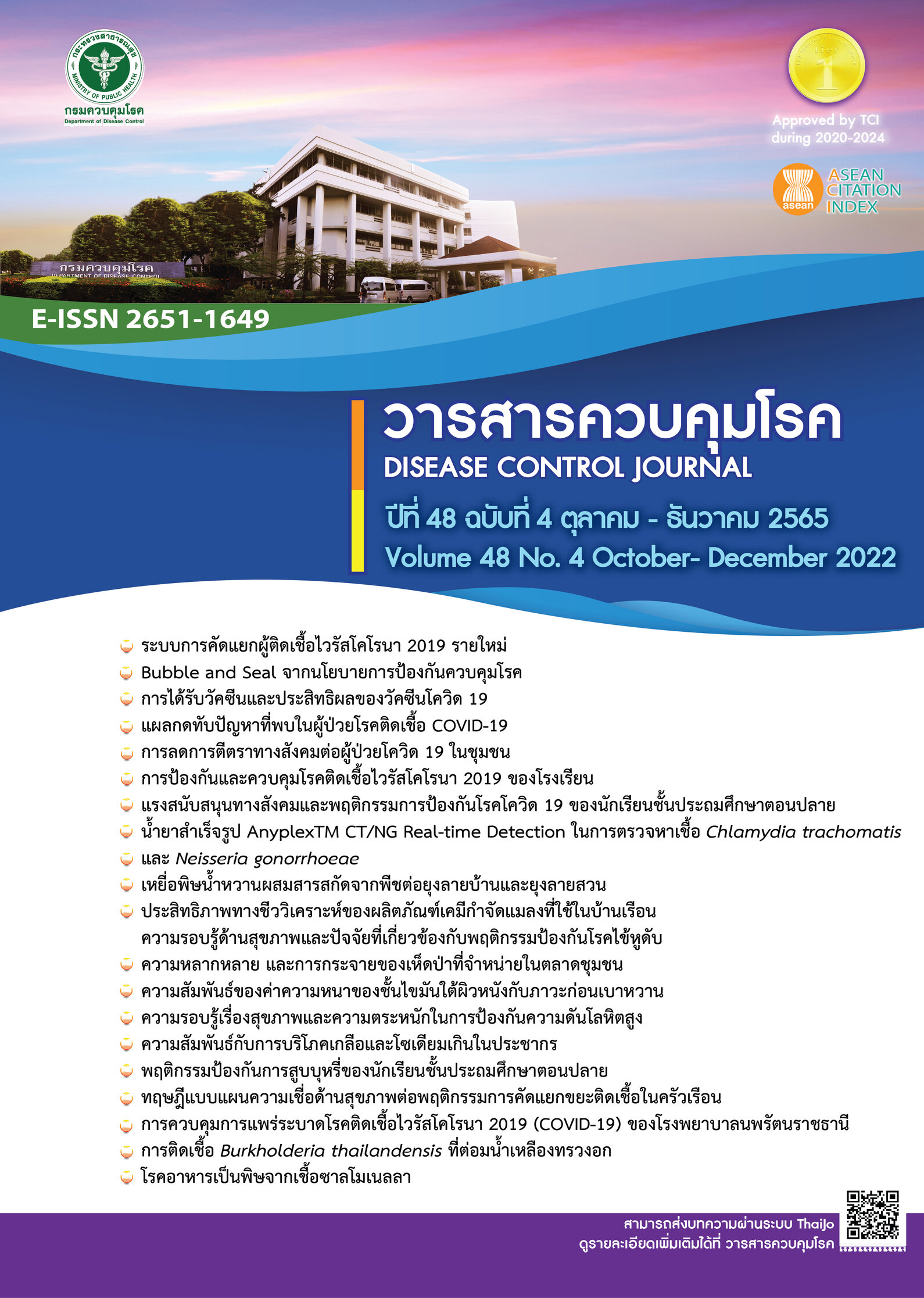The effects of health promotion program applying the theory of health believe model on household infectious waste collection behavior of bedridden caregivers in Buengkok sub district, Bang Rakam district, Phitsanulok province
DOI:
https://doi.org/10.14456/dcj.2022.76Keywords:
health belief model, infectious waste, sorting infectious waste, sorting infectious waste behaviorAbstract
This research was quasi-experimental research, which was conducted through two group pretest-posttest design to investigate the different behavior between experimental group and control group. The objective of this research was to examine the effects of health promotion program by applying health belief model on household infectious waste sorting behavior among 60 bedridden caregivers in Buengkok Sub-district, Bang Rakam District, Phitsanulok Province. The training was organized for educating the experimental group about health promotion program and brainstorming to determine ways for infectious waste sorting. A questionnaire was used as a research instrument to collect data from the experimental group (n=30) and the control group (n=30). Data were analyzed using descriptive statistics, including paired t-test and independent t-test with a 95% confidence level. The major findings indicated that after participating in the program, a mean score on infectious waste separation behavior of the experimental group was higher than that before implementing the program and was higher compared to the control group with a statistical significance (p-value < 0.0001).
Downloads
References
Department of Health (TH). Draft solid waste management action plan 2019–2021. Nonthaburi: Ministry of Public Health; 2018. (in Thai)
Pollution Control Department (TH). Information on Disinfecting solid waste management. Bangkok: Ministry of Natural Resources and Environment; 2018. (in Thai)
Division of Public Health and Environment. Monthly report of solid waste management. Phitsanulok: Division of Public Health and Environment, Buengkok Subdistrict Administrative Organization; 2018. (in Thai)
Pruekrathium Health Promoting Hospital. Report of population health outcome. Phitsanulok: Pruekrathium Health Promoting Hospital; 2018 (in Thai)
Manee-in J. Infectious Waste Management of Local Authorities [dissertation]. Bangkok: National Institute of Development Administration; 2013. (in Thai)
Khantong S. An Application of Health Belief Model and Empowerment to Behavioral Change in Solid Waste Management, Leamchabang Municipality, Chonburi Province [dissertation]. Bangkok: Mahidol University; 2001. (in Thai)
Becker MH. The health belief model and sick role behavior. Health Education Monographs. 1974;2(4):409-19.
Jantharin S. Effectiveness of Health Belief Theory on Household Waste Management Behavior of People in Tombon Moungtoa, Phayakkhaphum Phisai District, Maha Sarakham Province [dissertation]. Bangkok: Kasetsart University; 2013. (in Thai)
Sangyangyai W, Lormphongs S, Kijpredarborisuthi B. Factors Affecting Household Waste Reduction Behavior of People in a Municipality, Samutprakarn Province. The Public Health Journal of Burapha University. 2017;12(1):76-87. (in Thai)
Pollachom S. Active Learning National Conference, Walailak University. Health Belief Model in Waste Sorting, Self-Efficacy in Waste Sorting, and Waste Sorting Behavior of Nursing Students at Boromarajonani College of Nursing, Suratthani. Active Learning; 2018 Mar 26-27; Walailak University. Nakhon Si Thammarat: The University; 2018. (in Thai)
Downloads
Published
How to Cite
Issue
Section
License
Copyright (c) 2022 Disease Control Journal

This work is licensed under a Creative Commons Attribution-NonCommercial-NoDerivatives 4.0 International License.
Articles published in the Disease Control Journal are considered as academic work, research or analysis of the personal opinion of the authors, not the opinion of the Thailand Department of Disease Control or editorial team. The authors must be responsible for their articles.






